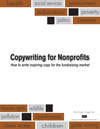On my desk is a great book called, “The Elements of Style” by Strunk & White. Every experienced professional copywriter I know has this book.
Get the book. Study the book. Use what you learn to create your own writing style for fundraising appeals.
Relax. I’m not a strict grammarian. And I’m not saying you ought to be an English major before becoming a fundraising copywriter. That’s actually a hindrance. Strong fundraising copy demands interpretation of the rules. (Smile)
Still, there are guidelines and rules worth following.
Let’s take a few excerpts from the chapter, “Words and Expressions Commonly Misused.”
Anyone – Written as one word it refers to “anybody” (I saw this misused on a vendor’s website yesterday. They meant to say “any one.”)
Any one – Refers to any single person or any single thing. Written as two separate words.
Contact – It’s vague, and also borders on cold jargon. “We’re sending this emergency appeal because our efforts to contact grant makers were unsuccessful. We need funds to cover operating expenses.”
Preferred: “We’re sending you this emergency appeal because every phone call, letter, and face-to-face meeting failed. The grant money is no longer available. Funds are needed today to pay utility bills so we can keep our doors open.”
Irregardless – Make this error and you’re scratching fingernails on a chalk board. It isn’t a word. It’s a double negative (-ir and –less).
“Irregardless of what the doubters think, research is taking us closer and closer to a cure.” YIKES. The writer or speaker is saying the exact opposite of what they intend to express.
Imply. Infer – These two words are not interchangeable. To “imply” is to suggest or to indicate without being explicitly stated. In contrast, “infer” is to derive by reasoning; deduced from the evidence.
Nice – This is another vague word. “It was so nice to receive your donation.” Ho-hum. Consider a specific example of what the donation means . . . “Sarah has food to put on the table for her family thanks to your gift. Bless you.”
Getting the basics correct makes a difference in your writing style. If you’re guilty of the examples shown above, you’re either not saying what you intend, or you’re being vague.
The result is a confusing appeal letter, email, or web copy. The result is lower response.
The book, “The Elements of Style” is worth your time to read. I refer to it frequently. It’s a tool that can help you develop your own distinctive style of copywriting. It can help you write stronger fundraising appeals.
What are some of the errors you’ve come across? Please share them in a comment below so we can all benefit.

{ 1 trackback }
{ 0 comments… add one now }